The Benefits of Physiotherapy for your Dog
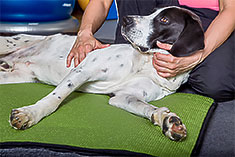
The field of animal physiotherapy has been around for some time, but it is becoming increasingly mainstream as both dog owners and vets have gained a better understanding of its benefits. Veterinary physiotherapists qualify by taking a post-graduate course specializing in the rehabilitation of animals.
The same techniques that physiotherapists use to treat a variety of injuries and conditions in humans have been adapted to suit animals. Those practicing physiotherapy with animals most commonly treat dogs and horses.
Family pets, show dogs, and working dogs can all benefit greatly from physiotherapy. Dogs whose activities involve a lot of agility are especially susceptible to the types of problems that physiotherapy can address.
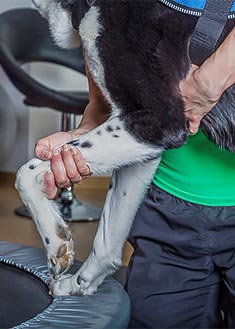
Canine Joint Issues
One of the most common issues affecting dogs is problems with their joints. These issues can be caused by a number of things, but often the cause is elbow or hip dysplasia, a developmental disease that causes the hip or elbow socket to form abnormally. This can cause the dog a severe amount of pain and lead to arthritis. It occurs more frequently in larger dogs.
The goal of treating this condition is to work with the dog's vet to manage the condition so that the dog can live comfortably. The physiotherapist will use a number of rehabilitative exercises to keep the dog's muscles strong and more able to support the dog, thus allowing it to be more mobile and suffer less pain.
The same applies to dogs with arthritis in other joints. Sets of therapeutic exercises designed to promote healing, along with machine therapies, such as PEMF (pulsed electromagnetic magnetic field) can help relieve pain, and preserve muscle condition.
Fractures
Another common issue faced by dog owners is having their dog hurt themselves, resulting in a bone fracture. Including physiotherapy in your dog's healing process will ensure that your dog makes a better recovery. Treatments can be used to prevent muscle atrophy due to lack of use while injured, which can only add to the problems the dog faces.
PEMF can be used on certain settings that encourage bone building cells to build on the fracture site. This is particularly good for non-union fractures that haven't healed properly after having been in a cast.
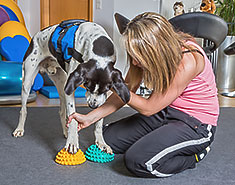
Muscle Problems
Dogs are prone to muscle strains or damage due to their often over-exuberant nature. They also suffer stiffness and aches and pains due to old age. A number of stretches designed to isolate certain muscle groups can help relieve muscle tension, especially when combined with massage and trigger point release.
Both PEMF and therapeutic ultrasound can be used to help damaged muscles heal by encouraging circulation. This brings fresh nutrients to the afflicted areas, and clears out debris at the injury site.
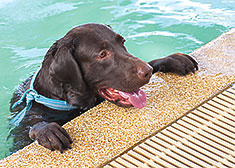
Dog Hydrotherapy
One excellent treatment for dogs is hydrotherapy, in other words, controlled swimming by experts at a dedicated dog hydrotherapy rehab center. It is particularly good for obese dogs that need to slowly increase their exercise to lose weight. It is also an excellent treatment for dogs suffering from joint problems.
Hydrotherapy can also be used to treat dogs that have had recent surgery to repair their cruciate ligament. This is a fairly common injury in dogs. Swimming allows the dog to strengthen its muscles without stressing its joints. Hydrotherapy must be introduced slowly and correctly to avoid over-stressing the dog's heart. When done properly is has wonderful benefits.
For physiotherapy to be the most effective it needs to be a team effort between the vet, physiotherapist, and owner. Often times the physiotherapist will leave the owner with a set of instructions that need to be strictly followed, such as basic stretches and limiting walks.
If you feel your four-legged friend could benefit from physiotherapy, you can get more information and perhaps a referral from your dog's vet.
Doggies Den: Latest Articles
 Homemade Thanksgiving Treats for Your Dog
Homemade Thanksgiving Treats for Your Dog
NUTRITION We all want to include our dogs in our holiday celebrations, but hopefully, you're aware that sharing table scraps with your dog isn't always the best idea.
 Keeping Your Dog Safe during the Summer Months
Keeping Your Dog Safe during the Summer Months
HEALTH Summer is coming on fast, so it’s time to plan how you will keep your dog safe and healthy through the lazy, carefree, warm days.
 Vaccination Time Again-Keeping Your Puppy Healthy
Vaccination Time Again-Keeping Your Puppy Healthy
DOG HEALTH So you have your new puppy picked out. There are quite a few shots, treatments and examinations that will keep the newest member of your family healthy.
 Canine Thanksgiving Feast
Canine Thanksgiving Feast
NUTRITION With the wide variety of food at Thanksgiving dinner, chances are you'll want to give your dog something special, too. If you're contemplating what to feed your dog for the holiday, here is a guide to a great Canine Thanksgiving Feast.
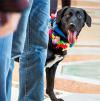 Dog Walking Tips Every Owner Should Know
Dog Walking Tips Every Owner Should Know
DOG FUN Walking your dog is not only crucial to keeping him healthy and happy, it strengthens the bond between your canine friend and his caregiver. There are a lot of obstacles out there. Don’t forget these simple tips to keep your walk fun and safe in the outside world.
 The Benefits of Physiotherapy for your Dog
The Benefits of Physiotherapy for your Dog
HEALTH The same techniques that physiotherapists use to treat a variety of injuries and conditions in humans have been adapted to suit animals with great success. Family pets, show dogs, and working dogs can all benefit greatly from physiotherapy. Dogs whose activities involve a lot of agility are especially susceptible to the types of problems that physiotherapy can address.
 The Decision- Adding a Dog to Your Family
The Decision- Adding a Dog to Your Family
FIRST TIME OWNERSBringing a dog into your family is a decision where many people don’t realize it’s magnitude until after they have the dog. There are a number of things that you need to research before you decide to purchase a dog, and it starts right in your own home.
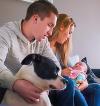 Bringing Your Dog Into Your New Baby's Life
Bringing Your Dog Into Your New Baby's Life
HEALTH Many believe that a dog and a new baby cannot happily coexist, so therefore the dog has to go. This is not necessarily the case.  A new baby does not mean you have to abandon your dog.

Doggies Den:
Most Popular Articles
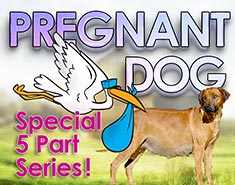
Dog Pregnancy Symptoms
HEALTHIf you suspect your dog might be pregnant, check out part one in this series on pregnant dogs, where we cover pregnant dog symptoms.

Dog Birth
HEALTHIn the third article of our dog pregnancy series, we look at the wonderful, but messy, process of bringing newborn puppies into the world.
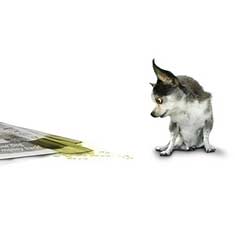
Indoor Dog Potties
DOG PRODUCTSIt's been a long day at work. You were so busy, you didn't even take time to eat a sandwich, let alone run home to let your dog out. You're on your way home, knowing the poor dog is crossing his or her legs by now, when your car breaks down, delaying you even further. Can't somebody make this easier?
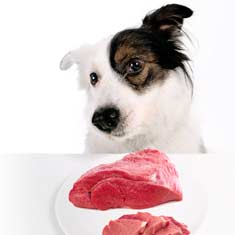
Your Dog’s Digestive System
PHYSIOLOGYEver wonder why your dog eats so fast? Or why he eats gross things? Or why he gets sick to his stomach? Or why his waste stinks so bad? Some of these things are normal, some are not.

Canine Respiratory System
BREATHINGThe basic function of your dog's respiratory system is to bring oxygen in to and remove carbon dioxide from the body. Knowing the symptoms of respiratory diseases can help you help your stay healthy.
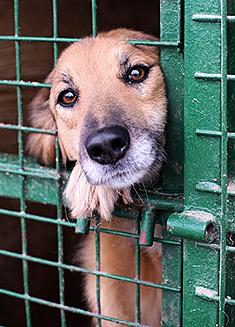
Shelter Dog Adoption Tips for Success
ADOPTION Are you intimidated by the prospect of "rescuing" a dog from a shelter? One reason that you may be wary of adopting a dog from a shelter is not knowing how to choose. Adopting a dog from a shelter can be a rewarding process, if you're prepared to do a reasonable amount of research.
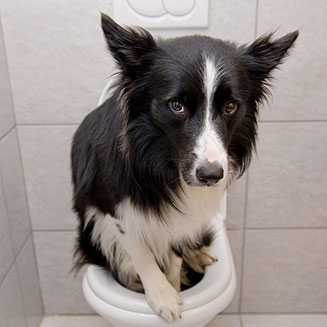
Canine Urinary Tract Infections
SYMPTOMS AND TREATMENTDoes your dog seem to be having trouble relieving his or her bladder? Learn how to recognize the signs of urinary tract infections and how to treat them before they spread.
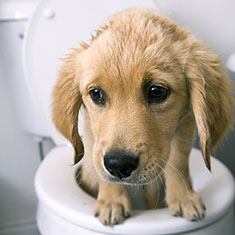
What to do for Dog Diarrhea
SYMPTOMS AND REMEDIESIf you have dogs in your house for any length of time, you have likely experienced at least one bout of dog diarrhea. Beyond the pain in the tuckus involved in cleaning up the mess, you should know what causes diarrhea, and when it's important to see the vet.

What to do for a Dog Bite
DOG BEHAVIOR Getting bitten by a dog can be scary, and you may be tempted to run around in circles for a while, trying to figure out what to do. Here's our guide to help you manage the situation.
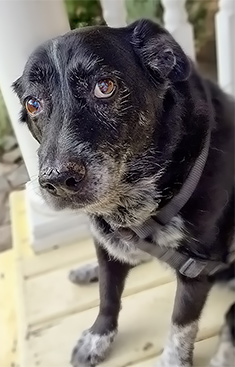
Top Ten Tips for Living with a Senior Dog
DOG HEALTH Bringing home a new puppy is so exciting, but it doesn’t take all that long for your exuberant puppy to grow into a senior dog who may have special needs. Here are the doggies.com top ten tips for taking care of your companion who has been with you through so much.
